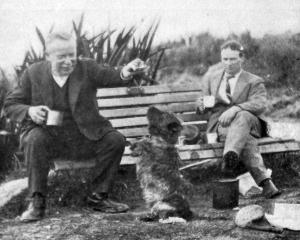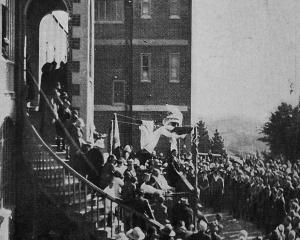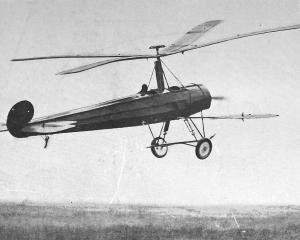They entertained the large audience that early filled the hall with the capping chorus ''Here we are,'' and others, and vigorously tussled for the honour of punching toy balloons to the tune of ''On the ball.''
The appearance of any well-known student or citizen was always the signal for wild cheers and yells.
The entrance of the graduates shortly before 3 o'clock was hailed with loud and enthusiastic cheering, which was followed by combined shouts of ''We want Stout,'' and ''Come on, Bobby.''
As the chancellor (Sir Robert Stout) and the other officials filed in to take their place on the platform the ''pit'' lustily struck up ''Here we are again,'' and followed it up with a vigorous haka. The conduct of the students, while hilarious, were not altogether unseemly, neither were the students what could be regarded as unruly.
• A visitor from a certain southern mining district tells a story illustrative of how increases in wages gained by the workers are ''passed on,'' with considerable additions, to the general public. The men employed in certain mines obtained, per medium of an ''award,'' a rise of one penny per ton in the hewing rate.
Forthwith the mineowners circularised the merchants who took the product of their pits to the effect that, in consequence of the increase in cost of production, they were compelled to advance the price of coal by 1s 6d a ton.
The merchants, in turn, informed the dealers that they were obliged, on account of the increased burdens which had been laid upon the mining industry by the award, to raise their prices by 2s per ton.
The dealers, for their part, promptly informed householders that the exactions of Labour forced them to charge 6s per ton more than they had previously demanded.
• A motion for the better protection of meat from sources of pollution was carried at the last meeting of the Christchurch City Council. The motion was tabled by Cr A. M. Loasby - ''That it be compulsory that all meat taken from the abattoir or other depots adopted by the council be removed to its destination in covered-in dust-proof conveyances and carried from the same to shops under hygienic conditions.''
He said it was a shame to see meat carried along Riccarton road in summer open to every bit of dust that a nor'wester could blow on it.
The regulations provided that men handling meat should wear clean clothing, to the satisfaction of the inspector, but some of the clothes he had seen were enough to put one off one's food.
Cr G. Scott said that he had meat with filthy covering which did not prevent swarms of flies from tainting the meat before it reached Christchurch. It was quite time the system was changed.
Cr J. McCullough said that the motion should have included meat offered for sale in the city. At present any filth from the streets could blow on the meat in butchers' shops.
• The Mangaweka Settler gives particulars of a fisticuffs encounter between two young men from Ruahine and Pukeokahu, at Taihape.
The Ruahine young man had introduced his friend to a young lady, and found that he was too attentive to her.
The suitors motored to a rendezvous with seconds, and the would-be supplanter had the worst of the encounter.
- ODT, 12.7.1913.












